This is a continuation of my previous question How to supress a dialog box an Inproc COM Server displays.
Background:
A recap of my situation: I have a Inproc COM Server written in Delphi from a 3rd party. One of the functions I call will display a error message dialog box if it traps a specific type of error. The issue is I am trying to process data in bulk, and the data source I am using is causing that error dialog to pop up a lot (thanks to the answer of my previous question it now auto closes and I was able to run it to completion, it would have shown the dialog box and required someone to press OK 9923 times). The process blocks till the message box is closed.
Question:
I would like to have better logging of what the error dialog said. However any attempt to get get the body text of the dialog box has failed.

//Snip
private void StartWindowListener()
{
//Queue the watcher on the message pump if we are not watching.
if (_watcherRunning == false)
{
_watcherRunning = true;
_dummyForm.BeginInvoke(new Action(() =>
{
_watcherRunning = false;
//If we are not inside the com object don't enumerate.
if (_insideCom == false) return;
// Enumerate windows to find dialogs
EnumThreadWndProc callback = new EnumThreadWndProc(CheckWindow);
EnumThreadWindows(GetCurrentThreadId(), callback, IntPtr.Zero);
GC.KeepAlive(callback);
}));
}
}
private bool CheckWindow(IntPtr hWnd, IntPtr lp)
{
// Checks if hWnd is the expected dialog
StringBuilder sb = new StringBuilder(260);
GetClassName(hWnd, sb, sb.Capacity);
if (sb.ToString() == "TMessageForm")
{
//This returns the dialog box's title
GetWindowText(hWnd, sb, sb.Capacity);
//This returns IntPtr.Zero
var hDialogText = GetDlgItem(hWnd, 0xFFFF);
if (hDialogText != IntPtr.Zero)
GetWindowText(hDialogText, sb, sb.Capacity);
//This returns a empty string
GetDlgItemText(hWnd, 0xFFFF, sb, sb.Capacity);
//Only sees the OK button.
IntPtr hCtl = IntPtr.Zero;
HashSet<IntPtr> seen = new HashSet<IntPtr>();
while ((hCtl = GetNextDlgGroupItem(hWnd, hCtl, false)) != IntPtr.Zero)
{
//When we see the same control twice, break out of the loop.
if (seen.Add(hCtl) == false)
break;
GetClassName(hCtl, sb, sb.Capacity);
SendMessage(hCtl, WM_GETTEXT, sb.Capacity, sb)
//Close the dialog by sending WM_CLOSE to the window
SendMessage(hWnd, WM_CLOSE, IntPtr.Zero, IntPtr.Zero);
}
//Snip...
}
return true;
}
//Snip...
// P/Invoke declarations
const int WM_CLOSE = 0x0010;
private delegate bool EnumThreadWndProc(IntPtr hWnd, IntPtr lp);
[DllImport("user32.dll")]
private static extern bool EnumThreadWindows(int tid, EnumThreadWndProc callback, IntPtr lp);
[DllImport("user32.dll")]
private static extern int GetClassName(IntPtr hWnd, StringBuilder buffer, int buflen);
[DllImport("user32.dll")]
private static extern IntPtr SendMessage(IntPtr hWnd, int msg, IntPtr wp, IntPtr lp);
[DllImport("kernel32.dll")]
private static extern int GetCurrentThreadId();
I thought I may have been interrupting the dialog before it gets to add the text to it (it is not fully painted yet when I break in the above code). However putting a Application.DoEvents inside StartWindowListener before it starts the enumeration allows the dialog box to fully paint but I still get the same results as I posted with the above code.
Doing a Ctrl-C works correctly on the dialog box so I could use that in a pinch, but being that I have to repeat this 9923 times I would like to avoid using that programmatically.
Is there any other methods I can try to get the text from the Message box?